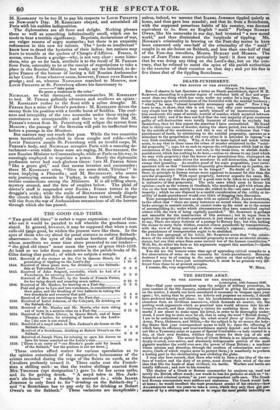DEATH - PUNISHMENT.
TO THE EDITOR OF THE SPECTATOR.
Glasgow. 7th January 1842.
Sin—I observe in last Spectator a letter on Death-punishment, signed M. B. SAMPSON, abounding in a greater degree of confusion both of fact and argu- ment than any thing which has come under my notice for a long time. The writer insists upon the coincidence of the homicidal with the suicidal tendency ; a which," he says, "almost invariably accompany each other." Now 1 beg leave to say, in short, that this is not true ; and offer your correspondent a very simple test by which he may satisfy himself of its incorrectness. Let him enumerate the cases of suicide, instead of murder, which occurred between 1800 and 1835; and if he does not find that the vast majority of poor creatures guilty of self-destruction were totally innocent of violence to anybody but themselves, then let him repeat the assertion I have contradicted. He found that in thirty-one cases of murder, during the above period, two were followed by the suicide of the murderers; and this is one of his evidences that " the punishment of death, by ministering to the suicidal propensity, operates as a stimulant to the perpetration of the very crime it is intended to repress,"--a very Irish conclusion, truly. Why, it would be more logical and much better sense, to say that in these cases the crime of murder ministered to the "suici- dal propensity "- ergo, let us seek to repress the evil passions which lead to the commission of the former crime, and not, in the mean time, to abolish death- punishment, which has nothing to do here,—unless we choose to say (and which we may with propriety) that the horror of an ignominious fate, consequent on his crime, in many cases drives the murderer to self-destruction, that he may escape that ignominy. As another proof of his main proposition, your corre- spondent tells us that "homicides frequently give themselves up to justice, ex- pressing at the same time a desire to be hanged." No doubt of it. But is there no principle in human nature more apparent to account for this than the suicidal propensity ? With equal propriety, however opposite the cases, Mr. SAMPSON may any that the prayer of a good man to be taken to a Letter world is indicative of that propensity. The only cases which seem to favour his opinion—such as the woman at Onolbach, who murdered a girl with whom she was on the best terms, merely because she wished to die—are cases of manifest insanity ; which no one disposed to a candid consideration of the utility or in- utility of death-punishment would ever think of dragging into discussion. Your correspondent favours us also with an opinion of Dr. JAMES Jonwson, to the effect that " there are many instances on record where the monomaniac lacks courage to commit suicide, or cannot make up his mind as to the means of accomplishing it ; under which circumstances they have committed capital crimes with the view of being capitally punished." Mr. SAMPSON is perhaps not amenable for the construction of' this sentence ; but to argue from it against the propriety of death-punishment, is just about as valid as if one were to say, There are many desirous of a passage to Botany Bay, but who, lacking 'the means to carry them thither, commit crimes punishable by transportation, with the view of being conveyed at their country's expense; consequently, the punishment of transportation ought to be abolished. In the last paragraph of his letter, Mr. SAMPSON avers that " the coinci- dence of the suicidal with the homicidal propensity is not an accidental circum- stance, but one that arises from some natural law of the human constitution." Well, Sir, do either his facts or his arguments support this assertion ?—Quite the reverse, as it appears to me. You did me the honour some time ago of appending critical remarks to a few observations of mine on the necessity for death-punishment. However desirous I may be of coming to the same opinion on that subject with the writer upon whom I have just animadverted, it must be on grounds very dif- ferent from those be at present occupies.
I remain, Sir, very respectfully yours, W. MILL.


























 Previous page
Previous page